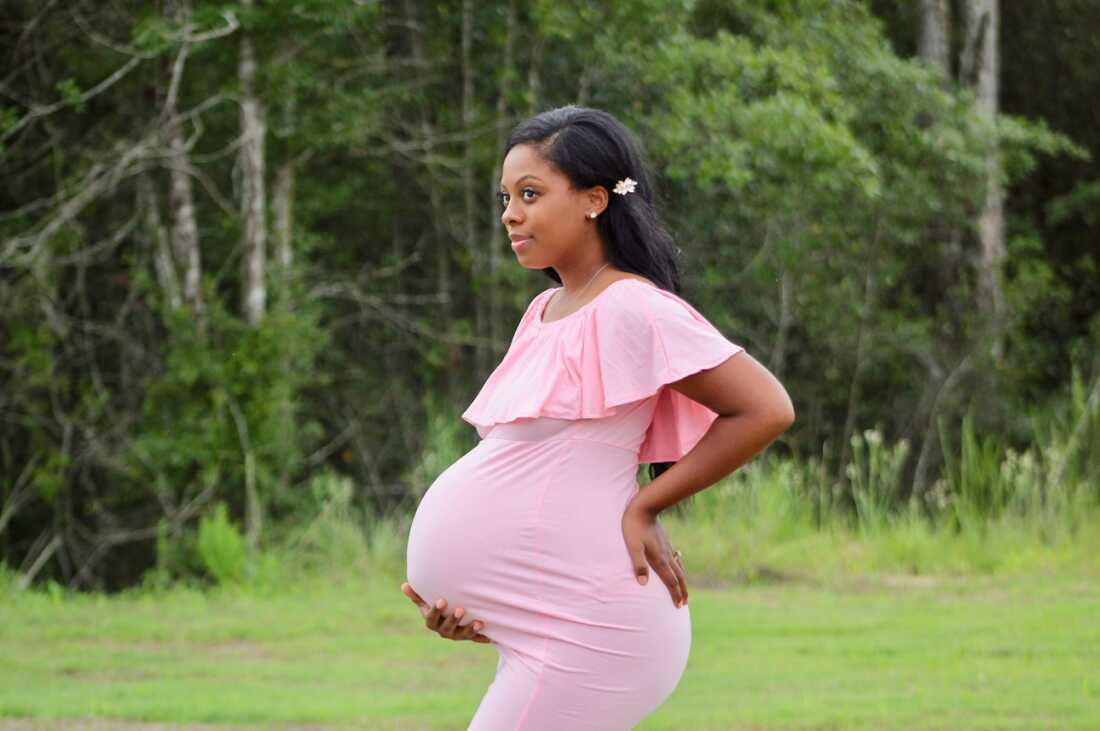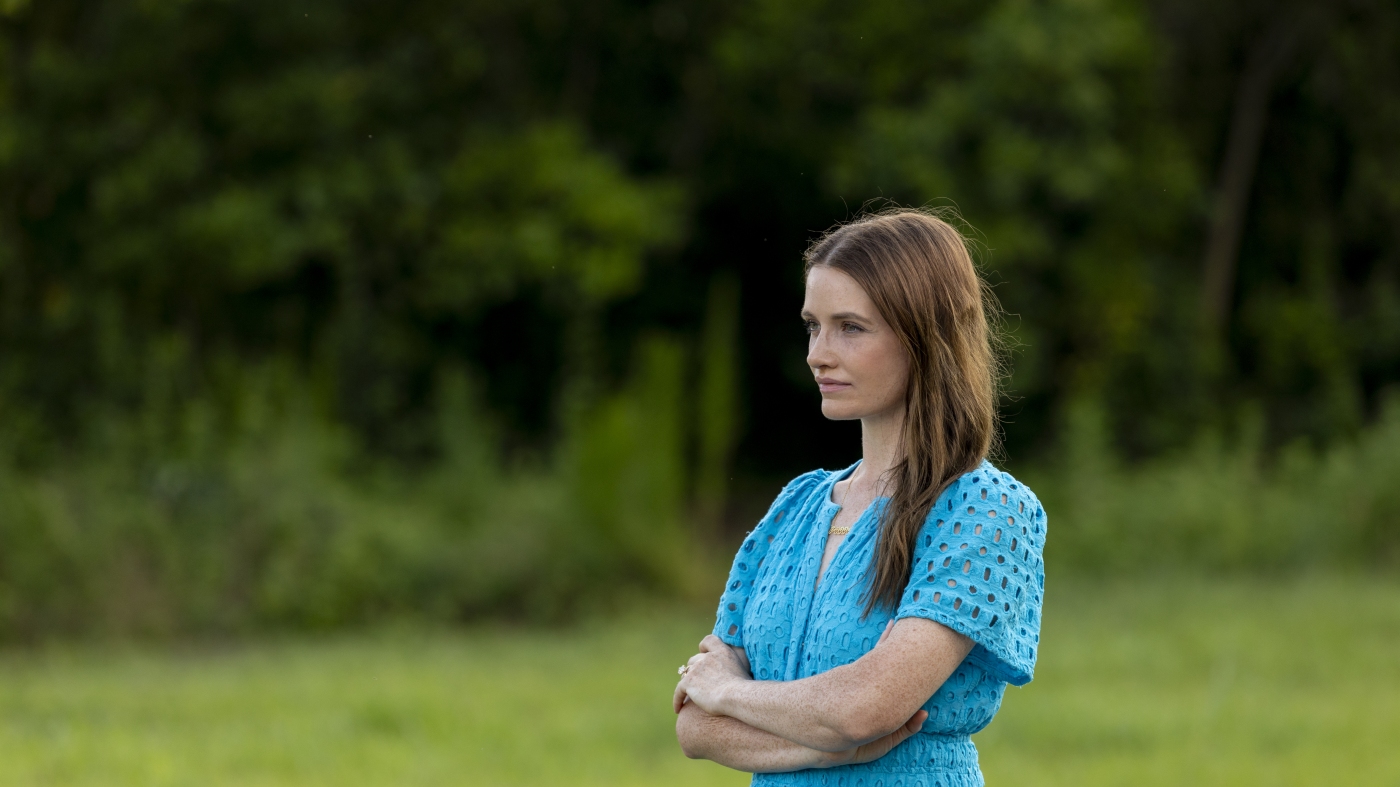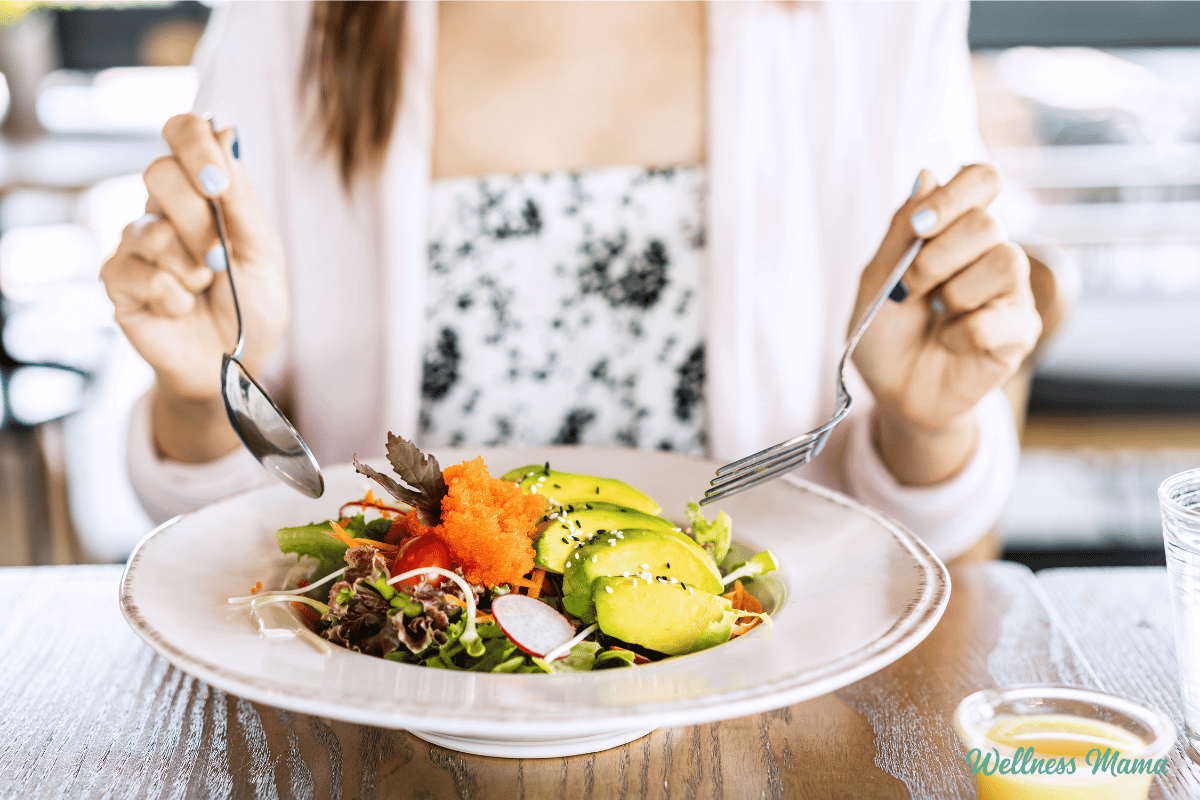
Katie Chubb, a neighborhood organizer, stands in an empty lot in Augusta, Ga., the place she’s been attempting to open a delivery middle for six years. She says lack of cooperation from native hospitals has been a main impediment.
Kendrick Brinson/For NPR
disguise caption
toggle caption
Kendrick Brinson/For NPR
Standing in entrance of an empty lot one afternoon within the Georgia warmth, Katie Chubb gestures to the place the place she’s been attempting to open a delivery middle for six years.
“We might have parking alongside the highway,” she says, describing her imaginative and prescient for a spot that may supply a extra home-like different to a hospital delivery.
Chubb is a neighborhood organizer in a state with a few of the best charges of maternal and toddler mortality within the nation. She says a delivery middle is badly wanted right here — Augusta, Ga., is surrounded by maternal well being care deserts, the place being pregnant care could be tough to seek out and few options exist outdoors of hospitals.
Her imaginative and prescient is for a freestanding clinic that employs principally midwives and works in partnership with obstetricians.
However regardless of widespread neighborhood assist and even affords of funding, Chubb has encountered impediment after impediment to her mission to supply extra protected delivery choices for girls.
Start within the U.S. could be harmful
The Trump administration has known as for Individuals to have extra kids. However advocates have been warning for years that maternal and toddler mortality charges are excessive within the U.S., displaying how harmful giving delivery could be. Mistrust of medical establishments and hospitals can also be rising throughout the nation. And a few folks need extra choices.
When Clarissa Viens was pregnant, she didn’t wish to have her child in a hospital. She apprehensive that docs would stress her right into a cesarean part or medication to hurry labor. Viens had earlier births each at residence and in a delivery middle in Alaska, the place she used to stay. “ You might be higher off at a delivery middle,” says Viens. “The infant’s higher as a result of they’re extra relaxed at delivery. They get pores and skin to pores and skin contact instantly. They do not get shiny lights,” she says.
With no comparable middle out there in Augusta, Viens determined to provide delivery at residence. When issues began to go badly, she did go to the hospital, however it was too late.
Her child was born within the automotive.
Throughout his delivery, she says, he skilled a wire prolapse — that causes the infant’s mind to be disadvantaged of oxygen — and her son suffered a mind harm.
He got here residence from the hospital with a ventilator and a feeding tube. Medical doctors are nonetheless assessing his analysis at 18 months, says Viens.
Looking back, she says, she would have made totally different choices. “However there is just one approach to go and that’s ahead from right here.” She and her husband are planning to have extra kids, and Viens says she nonetheless does not wish to go to the hospital for the subsequent one. She would fortunately go to a delivery middle, and needs she may’ve gone to at least one for her son’s delivery.
“If we had had a delivery middle, it could’ve modified his consequence,” says Viens.
Start facilities nonetheless unusual within the U.S.
There are about 400 delivery facilities throughout the U.S. in additional than 40 states, in response to the American Affiliation of Start Facilities. Whereas nonetheless comparatively uncommon, demand has been rising throughout the nation in recent times for these facilities, which might present a protected different to hospitals, for low-risk pregnancies.
Katie Chubb wished to discover a delivery middle when she was pregnant, however there wasn’t one close by. So, she drove greater than two hours to have her son. Realizing the necessity, she fashioned her personal group, obtained an ambulance switch settlement, recruited a health care provider to companion together with her, and even went as far as to efficiently advocate for a change in Georgia regulation, permitting delivery facilities to open with out the permission of native hospitals.
Nonetheless, delivery facilities require partnerships with hospitals and obstetricians to be able to switch sufferers when needed.
Hospitals will not cooperate .
Chubb says hospitals do not wish to quit potential income by surrendering sufferers to a delivery middle. “They’re placing their earnings over affected person wants,” she says.
Not one of the three hospitals in Augusta responded to interview requests, although one hospital — a part of the bigger Wellstar Well being System — issued an announcement through e-mail that mentioned they provide their very own “full ladies’s well being companies.”
Augusta will not be the solely neighborhood to battle with native hospitals. Comparable struggles to open delivery facilities have performed out in states together with Alabama, Mississippi, Kentucky and Iowa.
One more reason for resistance is concern over malpractice. Obstetricians are extra doubtless to be sued than other forms of specialists, says Andrea Braden, an obstetrician who works in Atlanta with each midwives and hospitals.
“That’s actually unlucky, however that’s the place loads of the resistance comes from,” she says. Braden will not be concerned with the trouble to open a delivery middle in Augusta.
She says obstetricians usually do not wish to companion with midwives for worry of being handed sufferers which are already in disaster and will end in a malpractice go well with. “The obstetricians who’ve actually excessive malpractice charges find yourself being caught with the legal responsibility,” she says. The American Medical Affiliation says OB-GYNs common 162 legal responsibility claims for each 100 physicians.
Excessive-risk pregnancies are usually not thought-about good candidates for delivery middle deliveries.
For Black ladies, a novel set of considerations

Jonquette Sanders-White had skilled wholesome pregnancies, till the delivery of her fourth youngster. Following the delivery she suffered a postpartum hemorrhage, one of many main causes of maternal mortality.
Sanders-White household
disguise caption
toggle caption
Sanders-White household
Giving delivery is much more harmful for Black ladies, who’re 3 times extra more likely to die from pregnancy-related causes than white ladies, in response to the CDC. The disparity has grown worse in recent times.
Jonquette Sanders-White went to the hospital two years in the past in labor together with her fourth child. The infant was fantastic, however Sanders-White had each a cesarean part and a hysterectomy. Hours after the surgical procedure, she remembers, her stomach was “getting extra distended by the second.”
She was hemorrhaging. The docs and nurses had missed it. Postpartum hemorrhage is without doubt one of the main causes of maternal mortality.
“ All I keep in mind,” she remembers, “is that nurses and docs rush into my room and so they’re screaming and shouting and so they say, ‘She’s crashing. She’s crashing, she’s dying. She’s dying!'”
Her husband, Treston White, remembers one nurse coming in to inform him “it wasn’t wanting good,” and to “be ready to inform her goodbye.”
White says he did not consider the nurse and selected as an alternative to hope. He did not assume God would take his spouse. “I had no room for doubt in any respect,” he says.
Although Sander-White made it, she is now suing the hospital and observe of surgeons who operated on her. The criticism alleges she nonetheless has severe problems from the occasion two years later. NPR reached out to attorneys for the docs and the hospital and didn’t hear again. Medical data included within the authorized criticism present she was hemorrhaging the day of the delivery.
Reflecting again on the occasion, Sanders-White says one of many many upsetting issues on that day was that she by no means interacted with a workers member of coloration.
“ I do assume if I used to be one other race, they might’ve been proactive,” she says. “A bit extra fast to react versus ready till I am crashing and dying.”
Sanders-White says her expertise has proven her that hospitals aren’t essentially the most secure place to be. She believes a extra holistically minded delivery employee would have been extra attentive to her wants and prevented her near-tragedy. “We completely want choices outdoors of hospitals,” she says. “My eyes are open now.”
It is tales like this that encourage Katie Chubb to maintain combating for her delivery middle. She says she will get weekly calls from folks asking when will probably be open.
Chubb grew up within the U.Okay., the place births attended by midwives are extra widespread. She moved to Augusta after she met her now-husband on a trip to the U.S. She says she by no means imagined this could be her life’s work, however says she thinks her outsider perspective helps. “ It makes me see the quantity of injustice and inequality there may be within the U.S. healthcare system,” she says.
“Particularly with lack of affected person autonomy,” and selections.







